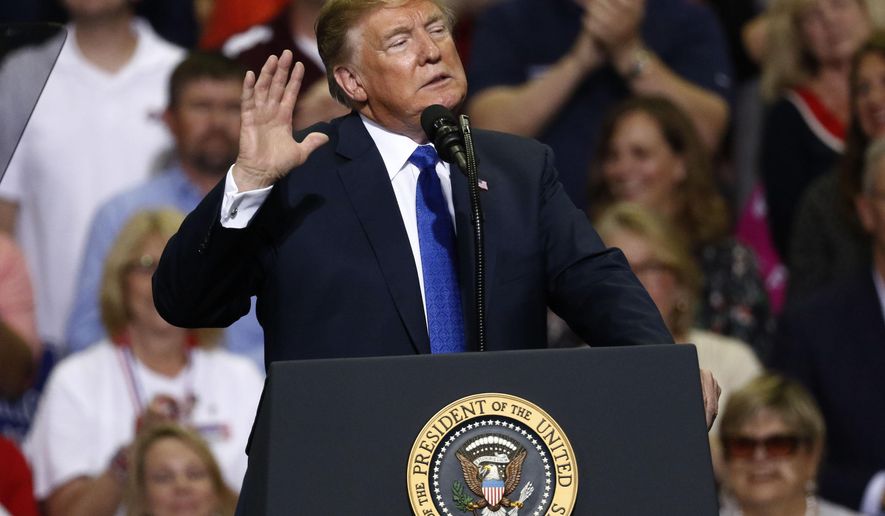President Trump is reassuring voters that he will protect people with pre-existing conditions from losing their health insurance, as Republicans who tried to repeal Obamacare face voters this fall who want to keep some of the law’s popular benefits.
Three times in the past week, Mr. Trump has inserted lines in his speeches highlighting the importance of the issue to him.
“We will always protect Americans with pre-existing conditions,” Mr. Trump told an electrical contractors’ convention in Philadelphia on Tuesday. “That’s a major part of what I’m all about.”
At a campaign rally Monday night in Johnson City, Tennessee, the president told supporters, “On pre-existing conditions, a lot of people think it’s not a very Republican thing. It is now, and it has been for me. I want to take care of people with pre-existing conditions.”
Mr. Trump came into office promising to repeal Obamacare, which forbids insurance companies from denying coverage or charging more for people with long-term conditions such as asthma, diabetes or cancer. Republicans eliminated the law’s penalty for not having insurance, called the individual mandate, but other provisions remain.
With the unemployment rate at historic lows and economic growth surging, Mr. Trump and the GOP could be expected to campaign almost exclusively on the strength of the economy and continued prosperity. But Democrats have been campaigning on health care in the midterm elections, and they’re finding a receptive audience.
A survey released by Pew Research Center on Wednesday found that 60 percent of voters believe it is the federal government’s responsibility to make sure all Americans have health care coverage, up from 51 percent in 2016. The issue is politically divisive, as 85 percent of Democrats and Democrat-leaning independents say it’s the government’s responsibility, but 68 percent of Republicans and Republican-leaning independents disagree.
Voters in 12 key battleground states rate the economy as their top priority, a Morning Consult survey released Wednesday showed, but health care ranks second for Democratic voters and third for independents. It’s fourth on the list of GOP voters’ priorities.
And an AP-NORC poll in late August showed that 36 percent of respondents approved of Mr. Trump’s work on health care.
Asked if the president’s frequent references to health care signal concerns that Republicans are losing that campaign argument, White House press secretary Sarah Huckabee Sanders replied, “I think it’s a sign that the president wants to protect people with pre-existing health conditions. He said that he supports that, and he wants to make sure that that’s not something that gets lost.”
House Republicans also are trying to express more support for patient protections. In September, 28 GOP lawmakers co-sponsored such a measure, many of whom had voted in 2017 to repeal Obamacare.
Senate Democrats on Wednesday introduced a resolution to overturn the administration’s expansion of short-term health insurance plans that went into effect the same day. Sen. Tammy Baldwin, Wisconsin Democrat, said every Senate Democrat supports her legislation to overturn the plans “that don’t have to cover pre-existing conditions and essential services like prescription drugs, emergency room visits and maternity care.”
“Anyone who says they support coverage for people with pre-existing conditions should support this resolution to overturn the Trump administration’s expansion of junk insurance plans, and I hope my Republican colleagues join us to protect people’s access to quality, affordable care,” she said.
On the campaign trail for GOP candidates, Mr. Trump has been telling voters that Democrats are “pushing so-called ’medicine for all,’ robbing our seniors of all of their Medicare benefits.”
“Republicans want to protect Medicare and our great seniors who have earned it and paid for it,” Mr. Trump said in Tennessee.
The Pew data showed that among Americans who see a government responsibility to provide health coverage, 31 percent say it should be provided through a single-payer health insurance system run by the government, while 25 percent say it should be available through a mix of private companies and government programs.
• Dave Boyer can be reached at dboyer@washingtontimes.com.




Please read our comment policy before commenting.